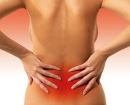Fighting Pain

Backache / Joint Pain:
Joints degenerate with wear and tear, injury and repeated stress. Osteoarthritis, one of the most common causes of joint stiffness and pain, is characterized by a progressive degeneration of cartilage. The cartilage is the slippery tissue that allows the ends of your bones to glide past each other without too much friction. Without healthy cartilage, the flexing motion can become painful or stiff. The knee is the most common collateral damage of joint overuse, though chronic pain in the finger joints and lower back are also common among women. Exercise is a must to strengthen muscles around the joint, and not overusing the affected joint. Pain relief is a must for those that live with daily symptoms. Analgesics like acetaminophen and paracetamol offer relief from pain, though they do not treat the underlying condition. Individuals with mild joint problems should engage in guided yoga practice of stretching and relaxing. If you have a knee problem, try vajrasana and padmasana. These asanas can increase flexibility. Yoga can serve a rehabilitative role following joint surgery.
Tip: Keep the affected area covered and warm, especially if you are in an air-conditioned room.

Migraine:
Migraines hit 15 to 20% of women in India. The pain can be so severe that apart from taking away the ability to function at normal capacity, some people experience temporary vision loss. There is plenty of medication out there so that you can successfully manage your migraines, rather than suffer them. First, understand yourself. Keep track of how often they occur and how severely they manifest. This can help your physician to gauge which medication would be most effective. There are two kinds of medication used to treat migraines: acute and chronic. Acute medication is used for immediate relief. Chronic preventive prophylactic meds are used by people who regularly suffer from migraines, or who, on occasion, suffer from very severe migraines. Triptans are a new family of acute medication yielding good results. But they are not for people with high blood pressure, heart disease, and hemiplagic migraines.
Tip: Often, migraines may be triggered off by binging. If you fear you have succumbed, pop antacids.

Gerd:
Cigarettes, caffeine in your cup and greasy biryani(A sort of greasy Pilaf) can get you sick to your stomach or more precisely, to your esophagus. It’s only meant to transport food from top to bottom, but sometimes, if the muscular opening separating the esophagus from the stomach opens when it should not, acids from the stomach can make contact with the esophageal lining, producing symptoms like a burning sensation in the chest or indigestion. This is gastro esophageal reflux disease (GERD), heartburn or acid indigestion. It is commonly treated with antacids and acid suppressants. Those who suffer from GERD should make some lifestyle changes – eat small, frequent meals; lose weight; restrict intake of coffee, chillies, chocolate and alcohol; stop smoking, elevate the head end of the bed at night and avoid drugs like nifedipine, an anti-hypertensive which relaxes the lower esophageal opening.
Tip: Chewing gum to stimulate the formation of saliva may help.